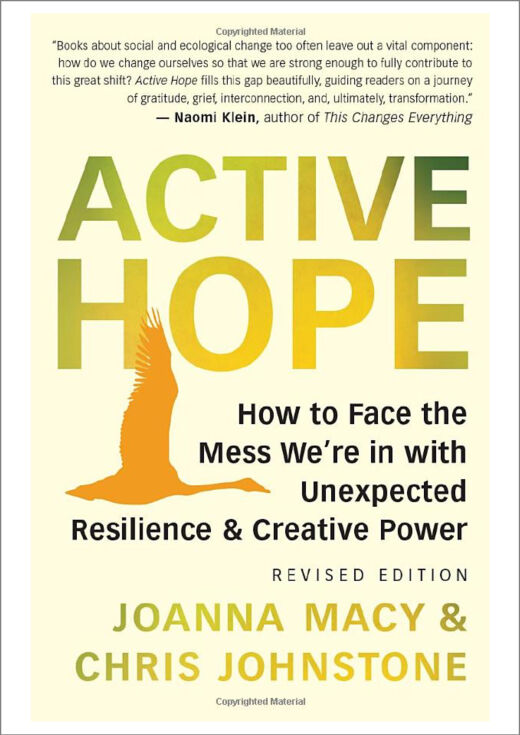An inspiring book to help us face the mess we're in with resilience, creativity and action.
Review of: Active Hope: How to face the mess we're in with unexpected resilience & creative power
Authors: Joanna Macy & Chris Johnstone
Reviewed by David Towell
Previously here I reviewed A Wild Love for the World, a collection of writings celebrating the life-time work of Joanna Macy. This title describes the driving passion behind her many contributions to building local and global resilience in ways that work well for everyone. Now she and her British co-worker have produced a timely new edition of their book Active Hope.
It's long sub-title nicely captures their intent: this is a practical guide to how all of us can bring hope and action together so as to make our world a better place in the face of its contemporary unravelling (the climate catastrophe, ecosystem collapse, extreme inequality, war, etc.) Nelson Mandela famously said that ‘the struggle is my life’ in reference to building a democratic and multi-racial South Africa. Active Hope is a workbook in the struggle for life: what we need to do to ensure that the beautiful gift we have inherited from history - the living world in all its amazing diversity and interdependence - is available to the generations that follow us.
Psychology is the study of mind and its relation to behaviour. Social Psychology is the branch of this discipline that seeks to understand these processes in their social context: our relationships with others. These authors adopt what can be described as an eco-psychological perspective. Borrowing both from the traditions of ancient religions (notably Buddhism) and modern systems theory they locate us - humanity - as an intrinsic part of the living world, a world constituted through a continuous process of interaction among systems embedded in larger systems from the simplest cell up to Earth as a whole (‘Gaia’). Our own well-being is intimately linked to the well-being of all the rest of life. When we act through our ecological selves, we both recognise this interconnectedness and draw inspiration from the wider web of life.

Active Hope is, of course, a call to activism and we certainly need the courageous and determined campaigning represented, for example, in the global ‘school strike for climate’ and nearer home, the direct action of Extinction Rebellion. But these authors have a much wider view of activists as anyone who is working for a purpose bigger than personal gain. My own friends include people participating in local initiatives to slash the carbon footprint of our towns and cities, reinvent sustainable agriculture, advance renewable energy supplies, change our consumption habits, build communities that value people more than things... and writing about all this to spread the lessons. We all need to be warriors in our own ways to achieve the radical transformation (the 'Great Turning') that is now essential.
The purpose of Active Hope is to help us build our capacity and commitment, individually and collectively, to advancing these goals. It's a workbook (sometimes repetitive) in the sense that it offers a compendium of exercises: some very simple, like interview guides we might use to inform our own reflections on the state of the world and the assets we bring to taking action; some more sophisticated, like the group processes Joanna has designed (the ‘Council of All Beings’, the exploration of ‘deep time’, both of which I describe in my previous review) that enable us to connect better with our ecological selves.
These exercises are organised into a series of steps that constitute what the authors describe as the ‘work that reconnects’. An important starting point here is openness to acknowledging the mess we are in without either being paralysed by the scale of the challenges or retreating into the 'business as usual' mentality that characterises the actions of the powerful. Rather, facing the pain of this reality is the basis for energising our responses: this is what is meant by the book's subtitle.
In turn, effective action requires that we use our imaginations to create an inspiring vision of what we hope for and draw from our own and historical experiences to strengthen our belief that real change is possible. People in South Africa did destroy Apartheid as a system; women did win the right to vote; we have countless examples of how we could have a new kind of prosperity without (GDP) growth.
All this becomes more possible when we build support (and help others build support) around us.
We know that geese can fly long distances because they share out the work of formation leadership. We can view ourselves as ‘flying’ with the team of life as a whole.
We need to live a new story.
If not us, who? If not now, when?
Active Hope is a text for our time.
The publisher is New World Library.
Active Hope: How to face the mess we're in with unexpected resilience & creative power © Joanna Macy & Chris Johnstone 2022 (Revised Edition)
Review: Active Hope © David Towell 2023
community, nature & economics, Sustainability, England, Reviews